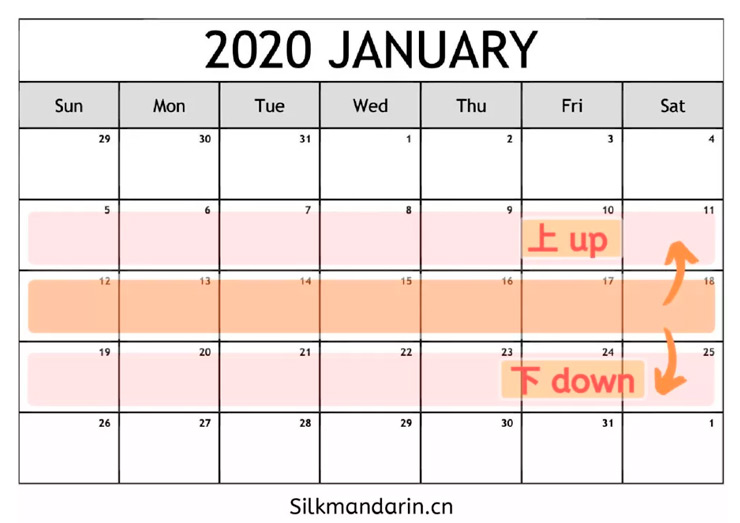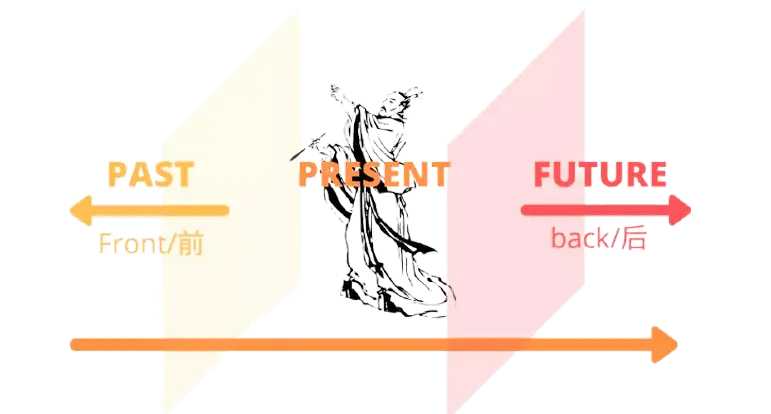Dec.11, 2019
上个星期 shàng ge xīngqī, next week? Last week?
Do you also usually get confused by the time expression in Chinese? Don't worry, in this article, let's find out how time expressions work in Chinese!
First, you need to know there're two groups of locality words in Chinese for time.
1. The first one is "上/下", literally "上" means "on, up",下means "under, down".
In the morning, the sun is still rising up, that's "上shàng"; and in the afternoon, the sun is going down, that's "下". Now, do "上午shàngwǔ-morning" and "下午 xiàwǔ-afternoon" make more sense to you?
What about 上个星期 (shàng ge xīngqī) and 下个星期 (xià ge xīngqī)?
Let's take a look at the calendar:

In the calendar, you can see the last week is literally "on" this week; and the next week is literally "under" this week. That's why we have:
这个星期/这周 this week
zhè ge xīngqī / zhèzhōu
上个星期/上周 last week
shàng ge xīngqī / shàngzhōu
下个星期/下周 next week
xià ge xīngqī / xiàzhōu
For example:
你上周末在干嘛?
Nǐ shàng zhōumò zài gànmá?
What were you up to last weekend?
In the same way, for month, we also apply in this way:
这个月 zhè ge yuè → this month
上个月 shàng ge yuè → last month
下个月 xià ge yuè → next month
For example:
我下个月不在上海。
Wǒ xià ge yuè bú zài Shànghǎi。
I'm not in Shanghai next month.
2. The second group is, "前/后 qián / hòu", literally means front / behind. This group of words is also commonly used for time expressions in Chinese.
The most typical ones are:
前天qiántiān → the day before yesterday
后天 hòutiān → the day after tomorrow
前年 qiánnián → the year before last year
后年 hòunián → the year after next year
But you might have questioned: In Chinese, why "前-front" means past and "后-back" means future?

That's the Chinese point of view towards the "time". Although it is quite opposite from the way how westerners think of the past and the future, it does make sense right?
2 weeks ago in Chinese is "两星期前"
(You might also hear some Chinese people say "以前yǐqián/之前zhīqián")
2 weeks later in Chinese is "两星期后"
(You might also hear some Chinese people say "以前yǐhòu/之前zhīhòu")
For example:
他两周以前走了。
Tā liǎng zhōu yǐ qián zǒu le。
He left 2 weeks ago.
我星期二前做完。
Wǒ xīngqī'èr qián zuòwán。
I will finish this by Tuesday.
你两周后之会收到结果。
Nǐ liǎng zhōu zhī hòu huì shōudào jiéguǒ。
You will receive the results 2 weeks later.
你会两周以后走吗?
Nǐ huì liǎng zhōu yǐhòu zǒu ma?
Are you leaving in 2 weeks?
That's all for today. You got it? I hope you understand the time expression much better after my explanation! Practice them and never get stuck on this next time!
Most Popular Posts
